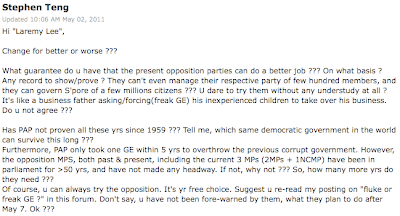I’m quite sad that political parties have to use little pockets of time in their speeches to reassure Singaporeans that their votes are secret.
If we still have to spend time discussing fundamental things like these, then what actual progress have we Singaporeans made as human beings?
Hence, I’m doing my part as a concerned citizen by posting this guide on voting and ballot secrecy, adapted from The Workers’ Party post on the matter.
You may, if you wish, download a guide here: everything on one-page or optimised for easier reading.
—
Have you heard people say that your vote is not secret?
Well, they’re either lying, or they’re stupid, or both. In all cases, they’re wrong – your vote is secret!
Here are some answers to Frequently Asked Questions about the voting process:
- Why does the election official call out my name and voter number at the polling station before giving me the ballot paper?
- Why must ballot papers have serial numbers?
- What happens after I cast my vote?
- After the election, politicians are able to highlight how certain communities supported Y party or Z party. This shows that votes are not secret!
- How else can you reassure me that my vote is secret?
Q: Why does the election official call out my name and voter number at the polling station before giving me the ballot paper?
A: This enables the representatives of political parties at the polling station to verify and cross out your name on their registers.
It is a transparent process to help all political parties:
- Prevent double-voting by any voter, and
- Ensure that the total number of ballot papers issued out and the total number of votes are the same.
BACK TO TOP
Q: Why must ballot papers have serial numbers?
A: This is to prevent instances of election fraud, such as:
- Bringing counterfeit ballot papers into the polling station,
- Vote impersonation,
- Exchanging ballot papers with those that have been marked by others, etc.
Places like the United Kingdom or New York State also maintain the practice of numbering their ballot papers for the above-mentioned reasons.
BACK TO TOP
Q: What happens after I cast my vote?
A: You can download a handy infographic from the Workers’ Party website, displayed here:

In sum, the following process will take place:
- When polls close at 8 pm, voting boxes are sealed and moved to counting centres. Civil servants will count the votes in the presence of the candidates and agents from all parties contesting an area.
- Once the votes are counted, the votes, together with all the relevant records – i.e. the stubs of the ballot papers as well as unused ballot papers – are sealed and transferred to the vault at the Supreme Court where they are kept for at least 6 months.NOTE:
- The votes cannot be retrieved unless a court order is obtained on the grounds of election fraud.
- According to the Elections Department website, no court order has been issued to retrieve votes to date.
- At the end of 6 months, the sealed votes and records will be transferred to an incineration plant for destruction. The whole procedure is witnessed by candidates/agents from all parties. Seals on the votes and records have been found to be intact.
BACK TO TOP
Q: After the election, politicians are able to highlight how certain communities supported Y party or Z party. This shows that votes are not secret!
A: No. Your individual vote is secret. Nobody knows for sure how each individual votes, even if an individual states that she has voted for Y party or Z party.
Why, then, are politicians able to make the above-mentioned claim? There are two reasons:
- First, the existence of polling stations:
- Each polling station serves about 10 – 20 blocks of flats and/or a few landed housing estates e.g. XX01 Polling Station in XX Constituency serves Blk 1 – Blk 15 of XX Road.
- Since the counting of votes is done by polling stations, it is possible to know the combined results of each polling station, which comprises a few thousand votes.
- Voting results by polling stations are accessible to all political parties contesting in that constituency.
- It is possible to estimate support by zones of residents e.g. The residents of XX Road in XX01 zone are more supportive of Y party, while the residents in XX02 zone are more supportive of Z party.
- However, it is impossible to narrow down the level of support to a particular block or an individual.
- Second, comments of politicians may be based on other estimates such as ground feel or verbal feedback.
BACK TO TOP
Q: How else can I be reassured that my vote is secret?
A: Tampering with the electoral process is illegal and tantamount to breaking the law.
Doing so is not in the interest of any political party elected to government – its power and legitimacy will be in question and its reputation tarnished locally and internationally.
BACK TO TOP
(Adapted from “Your Vote is Secret” by The Workers’ Party. More information on ballot secrecy can be found at the Singapore Elections Department website.
Download a guide here: everything on one-page or optimised for easier reading.


